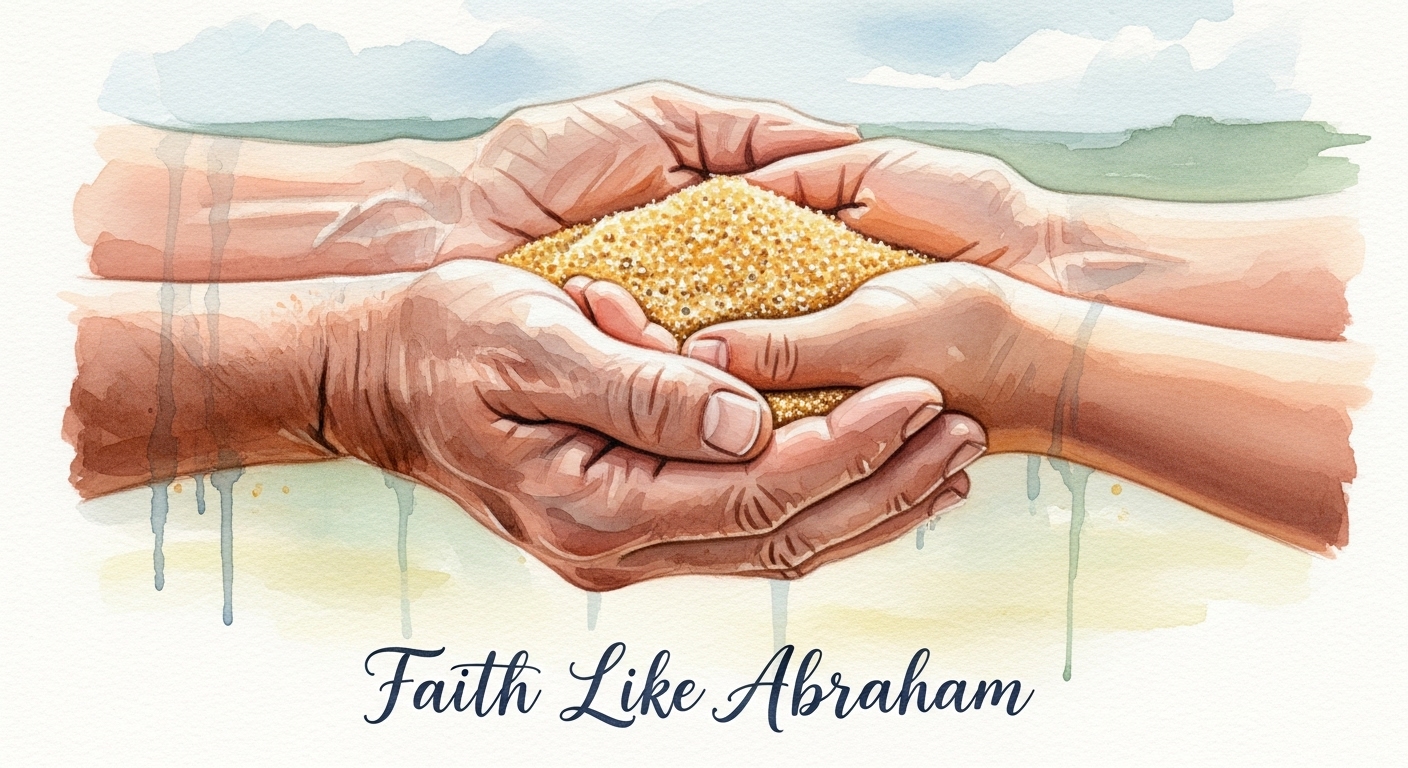Faith Like Abraham: Trusting God When You Can’t See The Way
You’ve probably heard of Abraham — the man often called the father of faith. His life reads like a series of dramatic pivots: a call to leave home, a promise that seemed impossible, a long wait, and a test that demanded absolute obedience. When you study faith lessons from Abraham, you begin to see a roadmap for trusting God when the path ahead is unclear. These lessons aren’t dusty relics from the past; they’re living patterns that can shape how you respond to uncertainty today.
In this article, you’ll walk through Abraham’s story, connect the dots between his choices and your circumstances, and get practical steps to cultivate faith like Abraham. You’ll see why trust often precedes proof, how obedience deepens trust, and why faith can be both messy and rewarded. Throughout, I’ll point you to Scriptural anchors so you can dig deeper: every verse reference links to the NIV text on Bible Gateway for easy follow-up. Keep the phrase faith lessons from Abraham in mind as you read — it will help you tie each reflection back to your own journey of trust.
Who Was Abraham — and Why He Matters
You might think Abraham was some remote, larger-than-life hero. In truth, he was a man with fears, flaws, and questions — just like you. The Bible introduces him as Abram, a man called by God out of Ur to head into the unknown. That call became the hinge of a story that shaped nations, faiths, and promises that still echo today.
Start with the call. When God told Abram to leave his country, his family, and his father’s house, it wasn’t a safe, easy request. It was a radical invitation to trust a voice rather than the visible comforts of home. You can read that moment here: Genesis 12:1-4. It’s foundational for the faith lessons from Abraham because it shows trust initiated before any outward proof.
Abraham’s life is woven with promises — descendants, land, and blessing. When you’re navigating your own hopes and promises, remember how these promises functioned in his life: repeated assurances from God, moments of doubt, human solutions that complicated things, and ultimately, a pattern of faith that God honored. One of the most pointed summaries of Abraham’s trust is found in Genesis 15:6, and you’ll want to keep returning to that verse as you consider what faith looks like in action.
The Call: Leaving Comfort to Follow a Promise
The first major episode in Abraham’s life is his call to go. God’s instruction to Abram to leave everything familiar forced a choice: cling to the comfortable and known, or step into uncertainty on God’s word. That moment is a classic example of faith lessons from Abraham — it shows how trust often requires a break with the past.
Leaving wasn’t just geographical. You can see it as symbolic of the daily choices you make to trust God instead of clinging to control, security, or identity found in the familiar. When uncertainty surrounds your job, relationships, health, or future, the impulse to stay where it’s safe can be strong. But Abraham shows you that trust sometimes demands movement — not blind leaps, but obedient steps in response to God’s voice. Read his departure account here: Genesis 12:1-4.
If you’re wrestling with that kind of call, remember: the call itself is often less about a single heroic act and more about a posture of willingness to obey. That willingness is one of the core faith lessons from Abraham.

The Promise: Faith Before the Evidence
One of the central faith lessons from Abraham is that faith enters the gap between promise and proof. God promised Abraham descendants as numerous as the stars, and yet Abraham and Sarah were old and childless. The promise was spectacular and yet palpably impossible by human standards.
God’s covenant with Abraham is recorded in several places, but you can grasp its significance in Genesis 15:6, where the Bible says Abraham “believed the LORD, and he credited it to him as righteousness.” This verse becomes a theological cornerstone for understanding how faith is counted as righteousness — not because Abraham had perfect obedience, but because he believed God’s word in the midst of uncertainty.
For your life, that means you don’t always need visible proof before you trust. Sometimes God’s invitation is to posture your heart around a promise and live in ways consistent with that promise while you wait. That posture — patient, hopeful, obedient — is a major faith lesson from Abraham and one that reshapes how you handle longings that seem stalled.
The Wait: Learning Patience in the Tension
Waiting is one of the hardest practical arenas for faith. Abraham waited years for the fulfillment of the promise, and in that waiting, he made choices — some wise, some not — that reveal how waiting refines trust. Waiting doesn’t mean passive inactivity. In Abraham’s case, it involved relational decisions, moments where he sought to secure God’s promise by his own means, and periods of doubt.
When you’re waiting — whether for a job, a child, a reconciliation, or healing — Abraham’s story teaches you that waiting can be a testing ground and a training ground. The Bible remembers both the faithful and the failed attempts. You’ll find echoes of this long-suffering patience in Hebrews 11:8-12, where the writer applauds Abraham’s faith even as he highlights the reality of the wait.
In practical terms, the faith lessons from Abraham teach you to expect that waiting will press you to choose between human solutions and trusting God’s timing. It’s in that pressure that your faith muscles grow.
The Test: Obedience When It Hurts
Perhaps the most wrenching moment in Abraham’s story is the test of his son, Isaac. God asked Abraham to offer Isaac as a sacrifice — a command that seems to contradict the promise God had given. This episode is often called the Akedah, and it’s one of the most discussed faith lessons from Abraham.
When you read the full narrative, you realize this was no abstract exercise. Abraham proceeded to obey, carrying the wood, binding his son, and raising the knife — until God provided a ram and stopped the act. You can read the full account here: Genesis 22:1-19. That scene presses you to wrestle with a hard truth: sometimes faith requires surrender of what’s most precious to you.
For your life, the lesson is not that God will ask you to kill your loved ones, but that trust sometimes asks you to release your expectations, control, or cherished plans. Abraham’s willingness to obey — even when the cost seemed unbearable — is one of the most powerful faith lessons from Abraham you can carry into hard seasons.
The Faith-Righteousness Connection
One of the biggest theological takeaways from Abraham’s life is found in Paul’s argument in Romans. Paul cites Abraham as the prime example of what it looks like to be counted righteous by faith. The phrase “Abraham believed God, and it was credited to him as righteousness” appears in Romans as a foundational proof of justification by faith. See Romans 4:3 for Paul’s direct citation.
Paul then expands the point in Romans 4:16-25, showing how faith is the means by which the promise belongs to all who believe, not by works. That linking of faith and righteousness is a critical faith lesson from Abraham: your relationship with God is defined by trust in God’s promise, not by your ability to control outcomes.
For you today, this means that faith isn’t merely emotional confidence; it’s a relational posture through which God imputes righteousness. That reality reframes your identity in seasons where consequences and outcomes are unclear.
Faith Is Tested, Not Perfected by Results
Here’s a truth you’ll want to hold onto: faith being credited doesn’t mean Abraham’s faith was perfect. The narrative includes moments of doubt and human attempts to manage outcomes — Sarah’s laughter, Abraham’s attempts to secure an heir through Hagar, and other missteps. Yet God’s covenant remained intact, and God’s purposes moved forward.
Hebrews summarizes Abraham’s faith with complexity: he “obeyed when he was called to go out,” “lived by faith,” and “offered up his son” trusting God’s promise. See Hebrews 11:8-12. The author doesn’t whitewash Abraham’s story; instead, the narrative holds up faith as a trajectory rather than a flawless record.
That encourages you: your faith journey can include failures, doubts, and human strategies. The faith lessons from Abraham show you that faith is often a pattern of returning to trust, repenting where you try to take God’s role, and continuing to follow God’s directions even after mistakes.

Faith Lessons from Abraham for Everyday Decisions
You might be thinking, “Okay, inspiring story — how does this translate to my decisions around work, family, or health?” Apply these core lessons:
- Trust often comes before visible evidence. You may need to move on God’s word even when the outcomes aren’t clear.
- Obedience is the language of trust. Small acts of obedience train you for bigger ones.
- Waiting refines trust. Don’t trivialize the formative power of the waiting room.
- God’s promises are generational. Your faith can carry blessings beyond your life.
These are practical faith lessons from Abraham you can harness when making real-world decisions. For example, if you’re sensing a call to change careers, these lessons help you weigh risk with trust. If you’re praying for a child or a healing, they help you posture your heart. If you’re called to forgive or move, they give you a biblical grid for obedience.
How to Cultivate Faith Like Abraham
Cultivating Abraham-like faith doesn’t happen overnight. It’s a process of spiritual disciplines, honest conversations, and incremental obedience. Below are practical steps that bring the faith lessons from Abraham into your daily rhythms.
- Listen for God’s voice: Pay attention to convictions and nudges that come through prayer, scripture, and counsel.
- Obey the next step: Don’t wait for perfect clarity. Take the next obedient action available to you.
- Practice patient waiting: Use the waiting season to deepen prayer, study, and community ties.
- Rehearse God’s promises: Regularly read and meditate on God’s promises so they become your inner script.
- Tell the story: Share how God has been faithful in your life to create a memory bank of reassurance.
These habits, derived from the life of Abraham, help you move from theoretical belief to practical trust. When you repeatedly choose obedience and long-term trust, you retrain your instincts away from fear and toward faith.
Practical Examples: Applying Abraham’s Faith Today
Let’s make this concrete. Here are a few life situations where the faith lessons from Abraham can shape your response:
- Job transitions: God’s call may come as a sense of disquiet about your current role. Taking a brave step often requires trusting God beyond the safety of your paycheck. Obey the next step — update your résumé, take a course, or pursue a conversation — and trust God with the outcome.
- Waiting for a child: Infertility tests your patience and hope. Like Abraham and Sarah, you may face long seasons where God’s promise seems delayed. Cultivate resilience by anchoring yourself in God’s promises and choosing faithful living in the present.
- Relocation or migration: Leaving home for a new place is emotionally costly. Abraham’s departure is a model: step when God calls, even if the reasons aren’t fully revealed.
- Health crises: Faith doesn’t guarantee instant healing, but it invites you to trust God through treatments, decisions, and uncertainty. Obedience might mean pursuing good care while resting in God’s sovereign purposes.
These examples show how the same principles that guided Abraham can become practical guides for your decisions. They illustrate how the faith lessons from Abraham apply to modern, often messy, realities.
Objections You Might Have — Honest Answers
You may have honest pushback: “How could God ask Abraham to sacrifice Isaac? Does that make God cruel?” or “Was Abraham a moral hero?” These are fair questions, and the faith lessons from Abraham become deeper when you wrestle with them.
- On the Akedah: The test of Isaac reveals both the intensity of Abraham’s trust and God’s provision. It points toward God’s sovereignty and foreshadows larger redemptive themes. Remember that God ultimately stops Abraham and provides a substitute (a ram), which reflects God’s character of provision rather than cruelty. Read the full episode: Genesis 22:1-19.
- On Abraham’s imperfections: Abraham was far from perfect. He lied about Sarah at one point and took human steps to “help” the promise along. The story doesn’t excuse these sins, but it does show a gracious God who works through flawed people. The faith lessons from Abraham include both his commendable trust and his human failures, reminding you that faith isn’t perfection but reliance on God.
- On faith and works: Some people worry that emphasizing faith, as in Abraham, minimizes obedience. Scripture shows the opposite: true faith produces obedience. James confronts this by showing that Abraham’s faith was demonstrated in his actions when he was willing to offer up Isaac. See James 2:21-24. Faith and obedient action go hand in hand.
Working through these objections doesn’t remove the mystery, but it helps you build a robust, honest faith rather than a naïve one.
The Generational Impact of Faith
One of the striking faith lessons from Abraham is the generational scope of God’s promises. God didn’t only promise immediate blessing; He spoke of nations and descendants. That teaches you that your faith can have ripple effects beyond your lifespan.
You don’t steward faith only for your own comfort. Your choices, prayers, and commitments contribute to family and community trajectories. Paul emphasizes that the promise to Abraham was meant for all who share Abraham’s faith in Romans 4:16-25. When you invest in faithful living — raising children, discipling others, stewarding resources with kingdom values — you participate in God’s broader unfolding plan.
This perspective reframes daily sacrifices. When you choose trust and obedience, you’re not only navigating immediate outcomes but also contributing to a legacy shaped by faith.
The Role of Promise in Building Courage
Abraham didn’t act without a foundation — divine promises gave him the courage to move. Promises are like spiritual infrastructure: they support risky steps when fear would otherwise paralyze you. Therefore, one of the most practical faith lessons from Abraham is to memorize, meditate on, and rehearse God’s promises.
You can do this by maintaining a list of specific promises you cling to during hard seasons, journaling how God has been faithful, and speaking these truths aloud in prayer. When your inner narrative is saturated with God’s promises, your courage to obey increases.
Scripture repeatedly recounts that Abraham held onto God’s promise even in impossible circumstances. You can hold onto the same types of promises — God’s presence, provision, wisdom, and ultimate redemption — and let them steer your choices.
Faith, Risk, and Responsibility
Faith involves risk. Abraham experienced risk — relational, social, and existential. But that risk was tethered to responsibility: he was accountable for his actions, his family, and his obedience. The faith lessons from Abraham show that spiritual risk is not reckless; it’s responsible.
You can apply this by taking calculated, prayerful risks rather than impulsive leaps. Consult wise counsel, weigh practical considerations, and then act in faith. That combination of prudence and trust honors both your responsibilities and your relationship with God.
How Doubt Fits Into Faith
If you’re honest, doubt will visit. Abraham laughed at promises at one point, and he made human moves to manage the situation. Doubt didn’t cancel his faith; rather, it exposed places that needed refining. One of the gifts of Abraham’s story is that it normalizes doubt while pointing you back to trust.
When doubt comes, turn it into questions directed at God. Ask God for clarity, admit your confusion, and keep obeying the next right step. That pattern echoes the faith lessons from Abraham: faith is a pilgrimage with moments of certainty and seasons of questioning, yet it presses onward.
Spiritual Practices to Strengthen Trust
To grow the muscle of faith like Abraham, incorporate regular spiritual practices. These active disciplines are ways you intentionally nurture trust over time.
- Daily reading of scripture: Root your mind in God’s promises and examples like Abraham.
- Prayerful surrender: Bring your fears and plans to God, asking for courage to obey.
- Community engagement: Share your journey with others who will encourage, correct, and pray.
- Storytelling: Regularly recount how God has provided in the past to reinforce trust for the future.
These practices help convert theoretical faith lessons from Abraham into lived reality for you. They create rhythms that align your heart with God’s voice and promises.
When Trust Is Radical: Moral and Ethical Implications
Some of the faith lessons from Abraham challenge you ethically and morally. Abraham’s obedience in the Akedah, for instance, forces you to consider how absolute trust interacts with moral conscience. In your context, trust should never excuse immorality or neglect of gospel ethics. Scripture itself holds up Abraham as an example of trust while also providing moral constraints that guard against abuse.
Your obedience should always align with God’s revealed nature — love, justice, mercy — and be measured against the whole counsel of Scripture. Use community and biblical wisdom to discern when a perceived “call” might actually be fear, pride, or error.

Faith That Leads to Blessing — But Not Always Immediate Comfort
One final reality: faith like Abraham can lead to blessing, but blessing does not always equal immediate comfort. Abraham received God’s promises and was counted righteous, yet he still faced hardship, detours, and heartache. The distinction matters: God’s blessing may be spiritual assurance, covenant relationship, and generational fruit, even when present circumstances remain difficult.
You can expect that persistent trust often yields fruit — sometimes now, often over time, and sometimes in ways you didn’t predict. That long view is one of the strongest faith lessons from Abraham; it teaches you patience, perseverance, and hope that extends beyond the immediate.
Conclusion — Taking the Journey Forward
If you want to live with faith lessons from Abraham in your life, start small. Obey the next right thing, rehearse God’s promises, and be honest about your doubts. Remember that faith isn’t a trophy for perfect people; it’s the daily practice of trusting God’s character and promises in the face of uncertainty.
Abraham’s life invites you into a story that is both ancient and profoundly practical. As you apply these lessons, you’ll find yourself shaped by the same trust that reoriented Abraham’s life — a trust that leads to righteousness, deepened obedience, and a legacy that blesses others.
Explore More
For further reading and encouragement, check out these posts:
👉 7 Bible Verses About Faith in Hard Times
👉 Job’s Faith: What We Can Learn From His Trials
👉 How To Trust God When Everything Falls Apart
👉 Why God Allows Suffering – A Biblical Perspective
👉 Faith Over Fear: How To Stand Strong In Uncertain Seasons
👉 How To Encourage Someone Struggling With Their Faith
👉 5 Prayers for Strength When You’re Feeling Weak

📘 Jesus and the Woman Caught in Adultery – Grace and Mercy Over Judgement
A powerful retelling of John 8:1-11. This book brings to life the depth of forgiveness, mercy, and God’s unwavering love.
👉 Check it now on Amazon 🛒💥
🔥 “Every great message deserves a home online.” 🌍💬🏡
Don’t let your calling stay hidden. Start a Christian blog or website using Hostinger — with 99.9% uptime, a free domain, and SSL, your voice can shine for God’s glory anytime, anywhere.
💥 Begin today. 🛒 Try it RISK-FREE! ✅
✝️ “Your body is God’s temple — care for it with purpose.” 💪💖🏛️
Renew your energy and restore balance naturally. Mitolyn helps support a healthy metabolism, giving you the vitality to live out God’s calling with strength and confidence.
🔥 Unlock Your Metabolic Power! ⚡Burn More Calories & Feel Great With Mitolyn. 💪
👉 Start Today. 🚀 Check Price Now. 🛒💰
💰 As a ClickBank & Amazon Affiliate, I earn from qualifying purchases.
📖 Acknowledgment: All Bible verses referenced in this article were accessed via Bible Gateway (or Bible Hub).
🚀 Want to explore more? 👉 Dive into our new post on Why Jesus? and experience the 🔥 life-changing truth of the Gospel!




